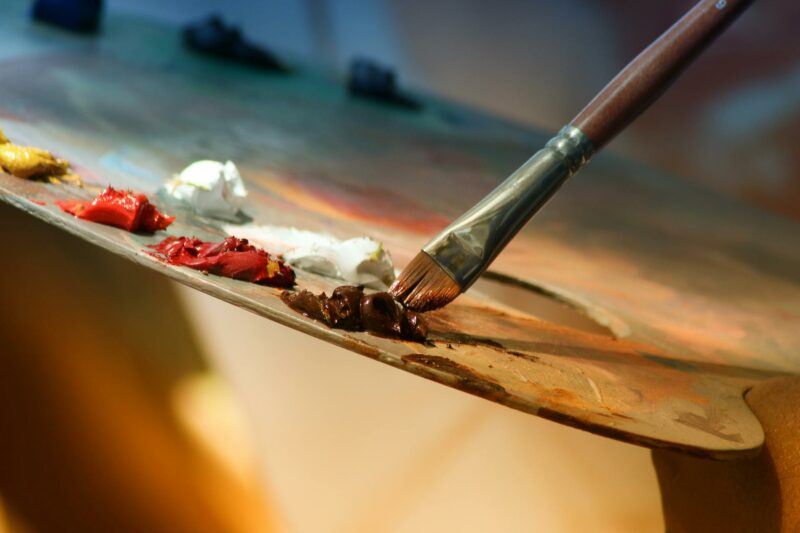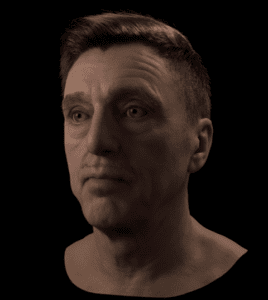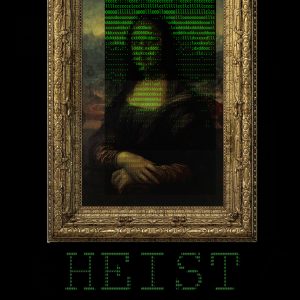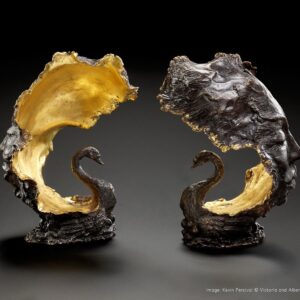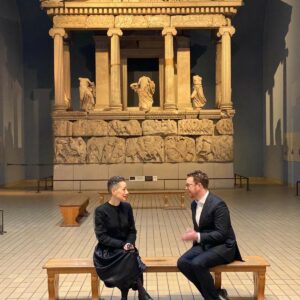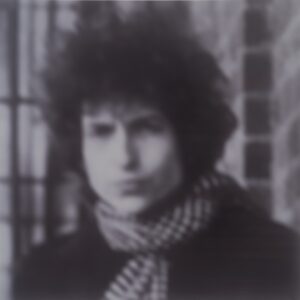Hito Steyerl states that in the 360-degree lens of VR bubble vision ‘…the viewer is at the centre of a sphere yet at the same time he or she is missing. To be eliminated means to be automated, and conversely, to be automated means to be eliminated’. She asks: ‘Are you already rehearsing how to be your own ghost?’
Embedded in this pixelated excess is a shadow economy. Behind the spectacle of the image is a virtual junk space of spam, conspiracy theories, fake news and surveillance stored in giant server farms. This is the debris of the failed and the repressed, a black economy of data and corrupted images, where agency is an illusion. Rage and fear are the new currency.
According to John Gray ‘In evolutionary pre-history, consciousness emerged as a side effect of language. Today it is a by-product of the media.’
BREAKING is a collaborative installation in response to this conundrum by artists Richard Ducker and Robert Good that immerses the viewer into this fraught disconnect and confronts a new self that is fractured to the point of annihilation.
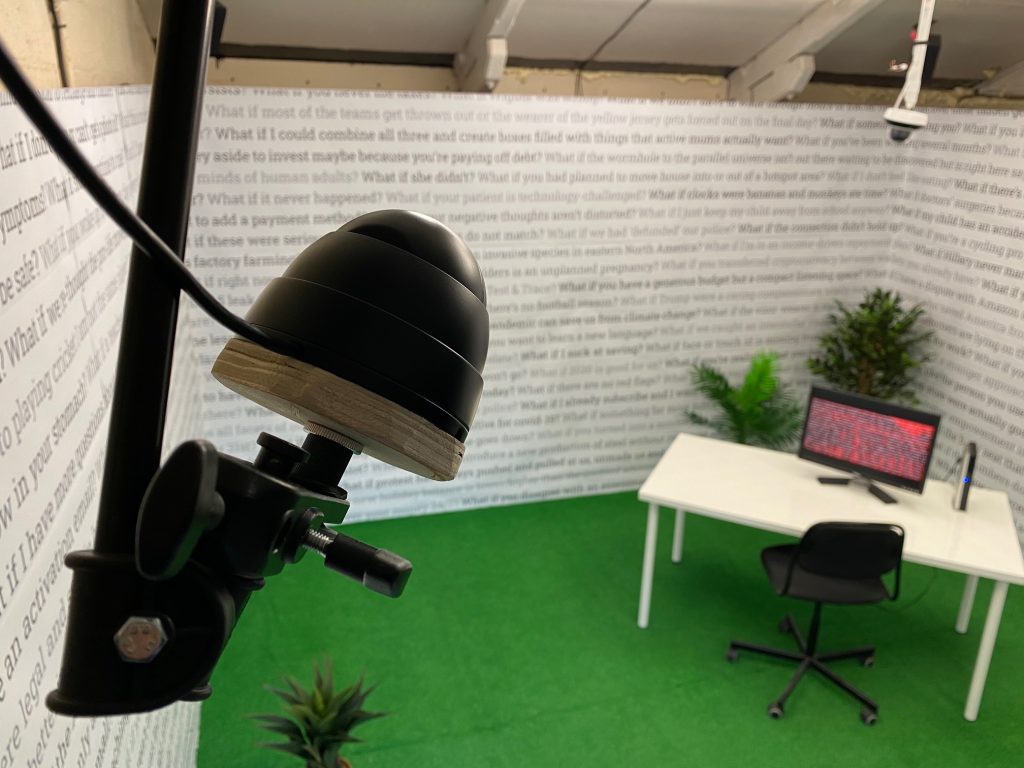
Their practice has been distilling these concerns for sometime into the familiar language of film, installation and text. With the Covid19 situation it was an easy decision to migrate to online only. The installation still exists, but can only be experienced as mediated through the various platforms of the virtual: the 360 gallery experience, the security camera, the online video and the website. All these aspects now constitute the work as it operates between the heat of the present and slowed down time of looking.
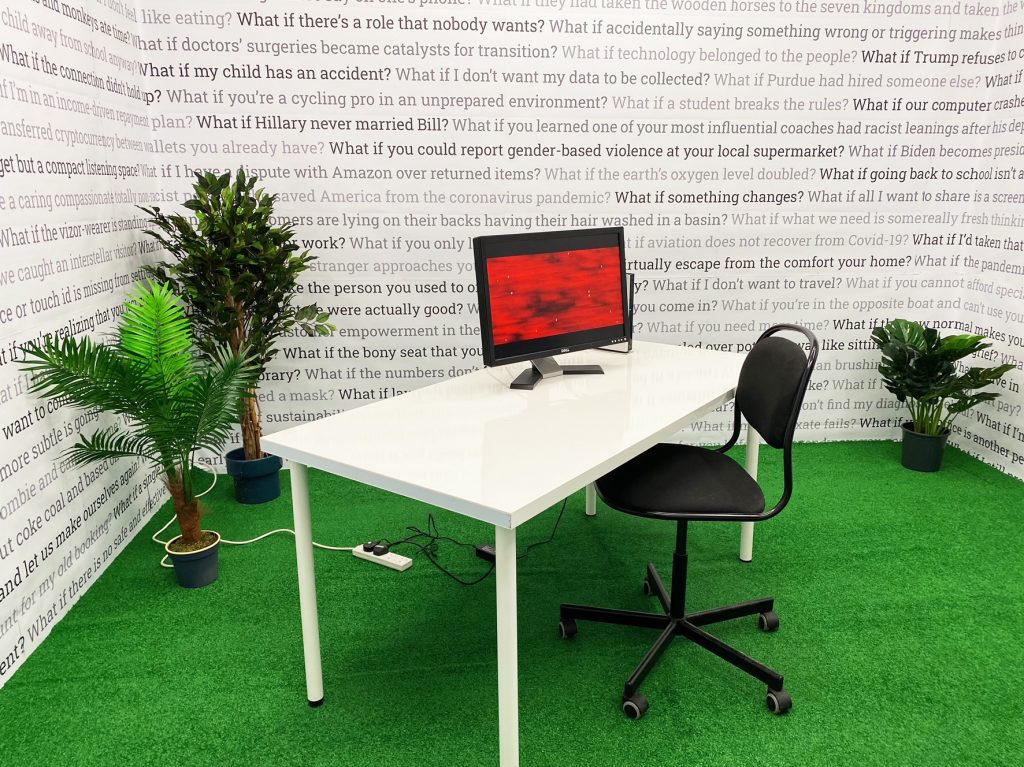
The gallery walls are lined with hundreds of collected Google News headlines, transforming the exhibition space into a claustrophobic and disorientating reverberation of claim and counter-claim. On an office desk a computer screen plays a looped hypnotic video of a train journey in which back gardens and private spaces roll past, while the two synthetic voices, one male, one female, seemingly engage in a conversation that reveals itself to be a rhythmically choreographed exchange of spam, news fragments, Facebook newsfeed, and spliced extracts from ‘Heaven’s Gate’ cult.
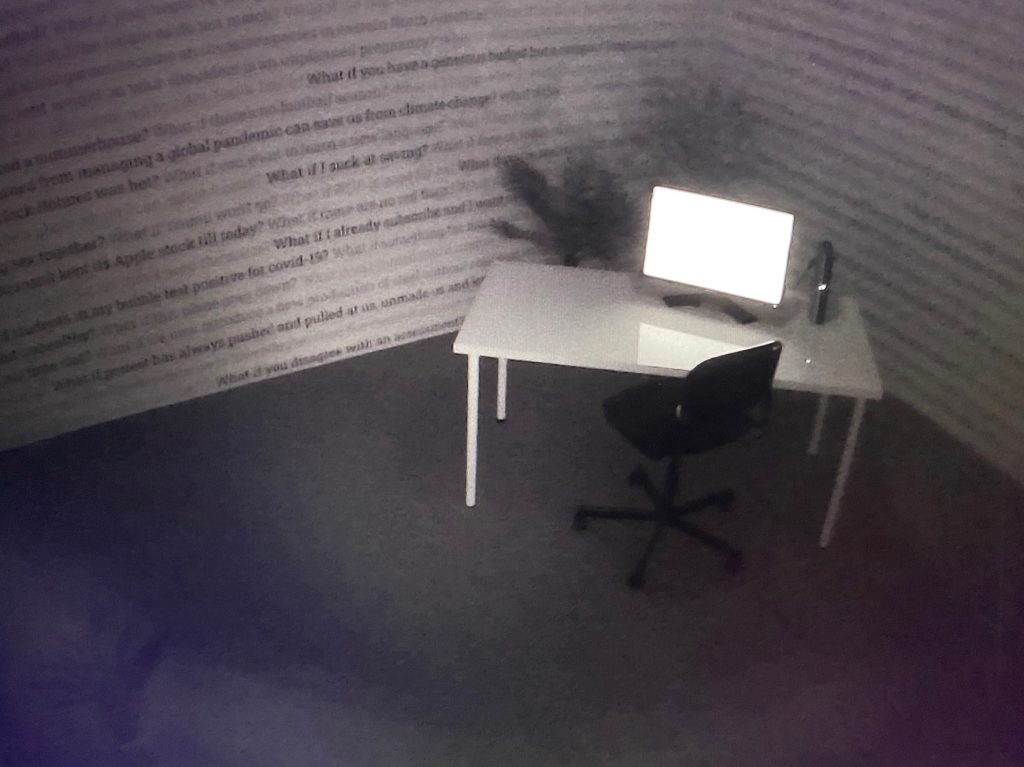
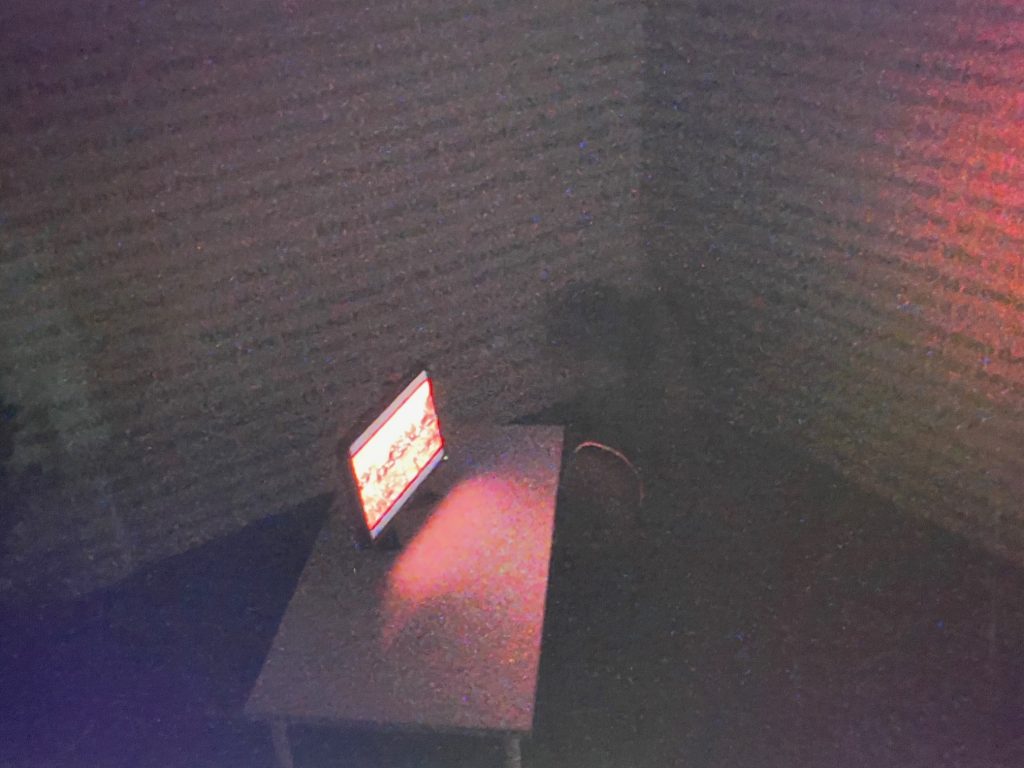
The gallery floor is carpeted in electric green Astroturf. This substrate becomes a substitute, replacing our grounding in the ‘real’ world with a fictional space, in which the artificial is privileged. Not the hyper-reality of online, but its over-heated anti-chamber: a paranoiac waiting room, its corporate foyer. The installation offers a glimpse into this overload, where the collapse of privacy and its corollary, the conspiracy theory’s paranoid escapism dominates the landscape. BREAKING articulates this spectacle of fragmentation and disorientation, which can only be viewed online through live feed cameras. This final process of mediation is not into the augmented constructs of VR, but the banal voyeurism of the security camera.
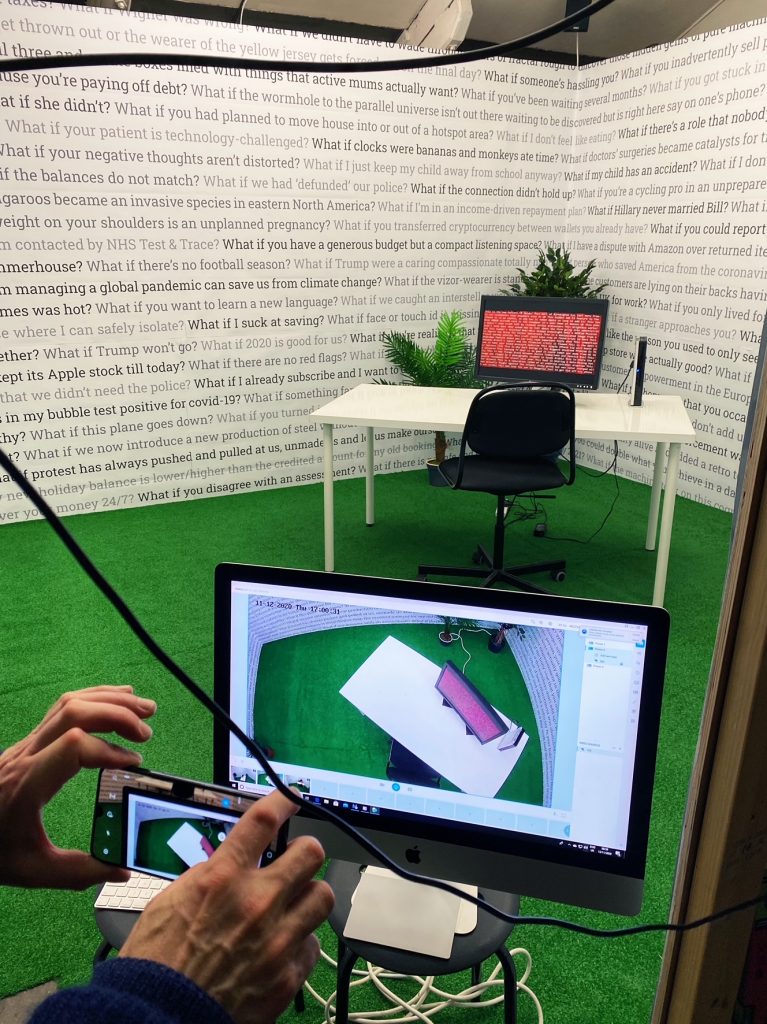
BREAKING An installation online by Richard Ducker & Robert Good – 7th February 2021 Hosted 24/7 at www.cable-depot.com
Day cameras: 10.00 – 18.00hrs / Night cameras: 18.00 – 10.00hrs, GMT
About the Artists
Richard Ducker’s practice brings together a wide variety of processes: sculpture-installation, sound, wall text, video, and photography and juxtapose these discrete elements to suggest narratives of displacement and explore multiple positions of authorship.
While Sci-Fi as a metaphor articulates our hopes, anxieties and desires, a by- product of its escapism is a loss of confidence in the present. It is these elastic narratives of adopted memories and constructed myths locked into a spectacle of theatrical interplay that is of interest. It is the sense of ‘wrong place, wrong time’ that prevails, or to use Giorgio Agamben’s phrase: ‘out of jointness’.
Since gaining his MA from Goldsmiths in 1991, Richard Ducker has exhibited widely throughout the UK and internationally, including: Kettles Yard, Cambridge; Royal Academy, Edinburgh; Mappin Gallery, Sheffield; The Kitchen, New York; The Yard Gallery, Nottingham; Katherine E Nash Gallery, Minnesota, USA; Venice Biennale (off-site); and in London: Serpentine Gallery; Flowers Central; Cell Project Space; CGP; Anthony Reynolds Gallery; Angus-Hughes Gallery; Coleman Projects; dalla Rosa Gallery; and Arthouse1.
In 2006 Ducker founded Fieldgate Gallery, a warehouse space in Whitechapel, that ran until 2008. Since then he has continued curate under the name of Fieldgate Gallery at various venues.
Over the last 2 years his practice has predominantly been in making films. www.richardducker.com
Robert Good wrestles with words to consider the frailties of language and the problems of knowledge. He asks how can we make sense of the news we are drowning in? How can we possibly be wise to the subtleties of global, regional and local politics, whilst also keeping abreast of fashion, sport, celebrity, the planet, space, science, and technology? In the world of 24/7 online news it feels like we are being bounced around like a pinball, ricocheting from one attention-seeking headline to another.
Robert Good collects the headlines offered to him by the Google News feed in an attempt to pause and stand back: to see if it is possible to externalise the information that we are fed and to take stock of it. Processing this material using both analogue (print) and digital (Python programming) techniques, his representation of this torrent of data is both challenging and strangely calming, a moment of Zen reflection.
Good graduated from Cambridge School of Art with an MFA in 2011. Recent projects include: The Word Bank of Lost Dialects at The National Centre for the Written Word, South Shields; Beyond Belief at Allenheads Contemporary Arts, Northumberland; and How To Know The Starry Heavens with Laboratory of Dark Matters. He is due to present Dr Good Investigates… What is Reality? at Science Gallery, Rotterdam in November.
He is editor of A New Dictionary of Art and hosts the podcast Something To Do With Art on SoundCloud. He founded the artist collective Art Language Location in 2012. www.robertgood.co.uk www.soundcloud.com/robertgood_art
About Cable Depot:
Cable Depot is a small art space on an industrial site in Woolwich near Thames Side Studios, which opened in August 2018. It functions as a hybrid space: both a physical location for art, which can typically be visited (not for the current project); and also an online space which seeks to present to a global audience via live cameras, 360 photography and other internet content, which invited artists engage with and explore as a valid and valuable format for experiencing art.Cable Depot hosts around 3 or 4 institution-length projects per year, typically two to three months including ample installation time (up to a month for some projects). The main programme, which is developed around 1-2 years in advance, is punctuated by intervals of about three weeks, which function as opportunities for free format spontaneous experimentation, typically with only a few weeks or months lead time. So far these have been mostly screenings, one-night events, or short shows and two murals on the outside front wall. These happen either by invitation or when artists have reached out to inquire about the space with interesting ideas and formats other than just a straightforward show. The next such event will be on the 21st May – a one evening sound art event by Matthew O’Donnell (MOOGZ) of Mytetra. MOOGZ will be presenting a work called ‘Malignancy’, based on recordings and sonifications made over a decade of his mother battling with cancer. Information on this project will be on the website within about a week meanwhile you can see other past and forthcoming projects here: cable-depot.com

